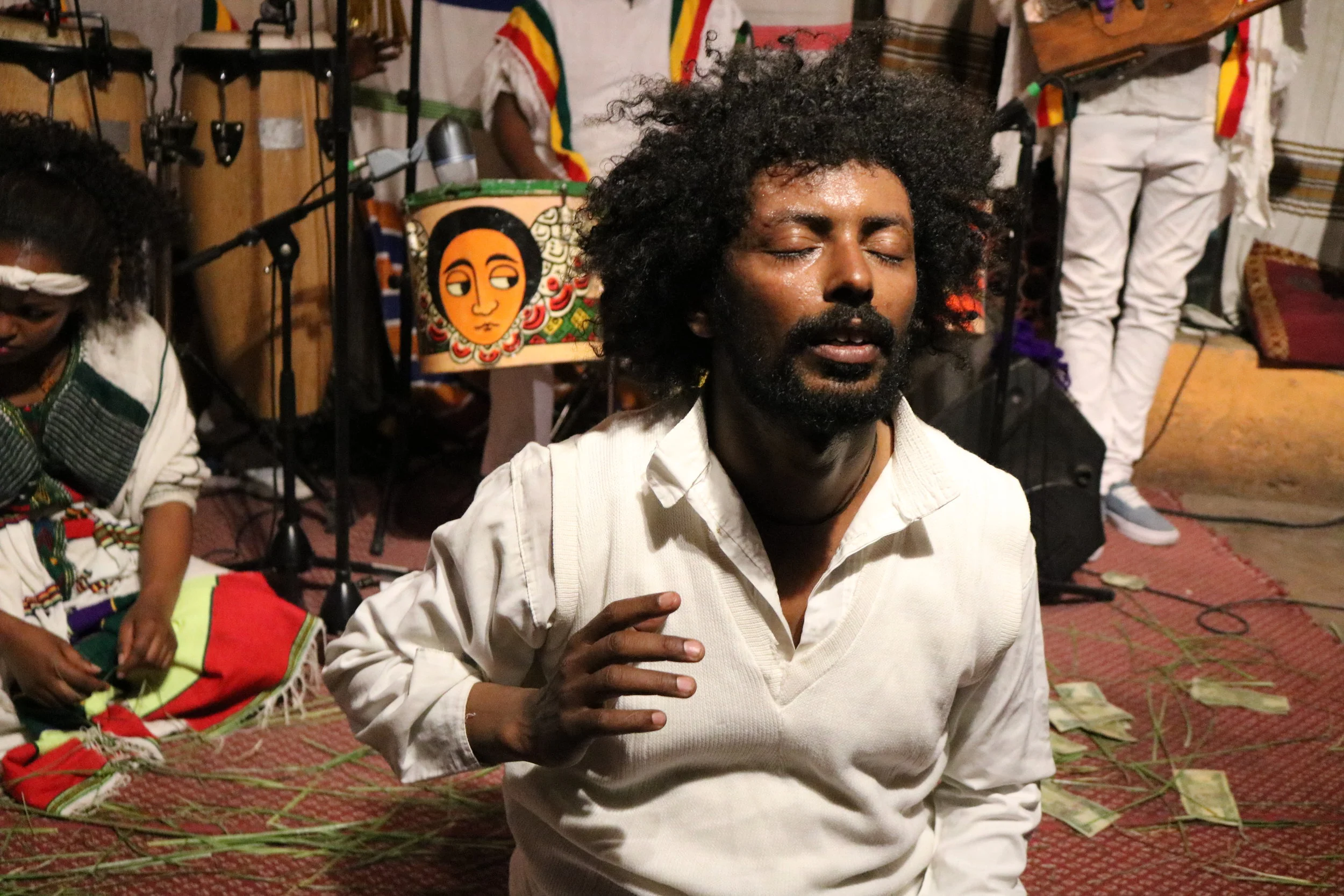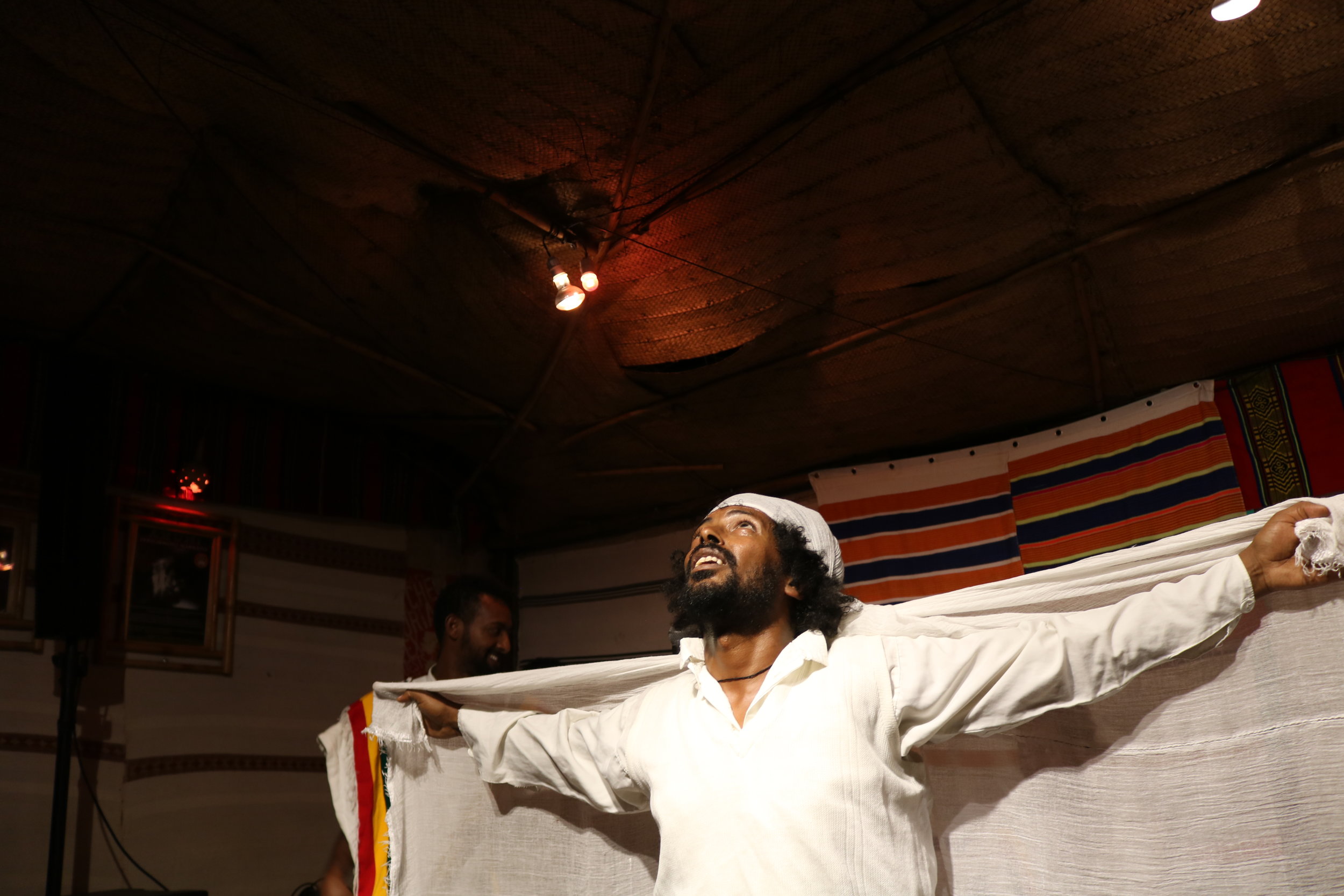melaku belay
At a Glance
Who Am I?
I am an Ethiopian dancer/choreographer, founding director of Fendika Cultural Center, working to bring global attention to indigenous arts and cultures of Ethiopia.
What Keeps Me Up at Night?
Some of the Ethiopian indigenous art forms will disappear eventually due to lack of support. Fendika, the most prominent cultural center in Ethiopia that supports indigenous arts, faces the threat of being forced out by the government.
What Do I Do to Solve the Problem?
Fendika promotes Azmari music, a 2000-year-old indigenous Ethiopian music form, by paying Azmari musicians regular salaries and programming Azmari performances all year round. Fendika is the only remaining Azmari venue in the Kazanchis neighborhood, which boasted 17 venues in the 1990s. But Fendika is not safe, as the government threatens to take over the land unless a 12-story building is constructed on it.
What Difference Does My Work Make?
About 18,000 local and global visitors experience Azmari music at Fendika each year. Our work has brought some global attention to indigenous arts of Ethiopia, through a 2017 UNESCO grant for a national Azmari festival, 2020 Prince Claus Award, and a 2015 French Medal for Arts and Letters.
Why Do Indigenous Arts Matter?
Ethiopia’s peace and stability are fragile, especially now. Arts promote peace and healing by bringing people together across differences. The loss of indigenous art forms will result in the weakening of our social fabric. Given the government’s mandate, no one knows what will happen to Fendika tomorrow. What’s under threat is not only a building, but also memories and hopes for indigenous arts of Ethiopia.
How Can You Help?
You have the power to help us, by telling our story, and/or by helping us reach out to potential supporters and investors. I hope you buy a plane ticket to visit us in Ethiopia so that you can experience the joy of Azmari music and the magic of Fendika. Then you will understand why our supporters tell us “Fendika is our Noah’s Ark.”
What More?
Contrary to the myth that I am wealthy from owning Fendika, I struggle to pay rent for a two-bedroom apartment in Addis Ababa, where I live with my family of five; I give everything I have and work 20-hour days to keep Fendika’s programs going. I feel rich in my heart: through working with the arts, I share the joy and pain of all humanity.
I am passionate about mentoring young artists. Some of our best dancers and musicians started working at Fendika as waiting staff and cashiers. Now they are touring the world with my band also named Fendika.
Fendika survived COVID-19 by streaming 18 concerts; we were among the first organizations to stream concerts from the African continent. Now Fendika is livestreaming 2-3 concerts a week.
Email: fendikazmari@gmail.com
Phone: +251 911 54 75 77
Biography
The founding director of Fendika Cultural Center, Melaku Belay is a world-renowned Ethiopian dancer and an ambassador for Ethiopia’s music and dance. In 2018, he became the founding president of Ethiopian Dance Art Association. Melaku was celebrated as a finalist for the 2018 Ye Bego Sew Award (Ethiopian Person of the Year), in the category of raising global awareness of Ethiopian culture. Melaku’s international honors include a 2015 Chevalier des Arts et des Lettres (France), a 2019 Visa for Music Award (Morocco), a 2020 Prince Clause Award (the Netherlands), a 2021 Ethiopian Role Model Award, and a 2022 TED Fellow.
Melaku Belay is a contemporary virtuoso interpreter of eskista. His spectacular mastery of eskista has earned him the nicknames of “walking earthquake” and “King of Eskista.” Growing up as a street kid in 1980s’ Ethiopia, Melaku learned many regional dances of Ethiopia in religious festivals such as Timket, folk ceremonies, and everyday activities in Addis Ababa and the countryside where music and dance are a vital part of cultural and spiritual expression. More recently, he has traveled throughout Ethiopia to learn the dance traditions of the country’s 80 tribal groups.
Grounded in these traditions, Melaku has fashioned his unique style of performance. In close collaboration with musicians of many genres and backgrounds, Melaku mesmerizes his audiences with “astounding” “rhythmic virtuosity” and superlative artistry (observed by the dance critic of The New York Times in 2011, of Melaku’s performance at Kennedy Center). He has shared stage with legends including Getachew Mekuria, Mahmoud Ahmed, Alemayehu Eshete, and Girma Beyene. Notable international collaborators include the Ex (Netherlands), Debo Band (USA), Akale Wube (France), Le Baroque Nomad (France), Large Unit (Norway), Aste Tewoderos (Italy), Saba Anglana (Italy), Enzo Favata (Italy), Ken Vandermark (USA), Jose Torres Trio Flamenco (Spain) and dance artists of many genres from around the world.
Dance Film Ahun! (2014)
Since 2010, Melaku has created contemporary site-specific dance works in Addis Ababa to engage the spatial, sonic and psychic dimensions of Ethiopia’s recent development. Examples include Ahun! A short film of Melaku dancing in Mercato, and Soundclashes and Crossfades, a multimedia collaboration with Jeroen Visser.
Melaku is passionately committed to the preservation and development of Ethiopian performance culture and heritage, especially the heritage of Azmari music. Melaku fights hard to keep Fendika open so that the Azmari tradition can flourish in the 21st century. Fendika has survived and thrived, due to Melaku's belief in the tremendous creative potential of Azmari music, his ability to mobilize support from Ethiopian and international audiences, and his hard work and innovative spirit. Melaku’s Fendika was the first Azmari bet to pay Azmari salaries, reforming the age-old custom where these musicians only earned tips.
Melaku’s vision for Fendika is to develop it into a premier cultural center, a welcoming home to artists of many disciplines and cultural backgrounds. To realize this vision, he expanded Fendika Azmari Bet and founded Fendika Cultural Center in 2016. Since then, Fendika Cultural center has curated numerous visual art exhibits showing works by local and international artists. In addition. Fendika Cultural Center also hosted monthly poetry readings and scholarly presentations related to Ethiopian art and culture.
Melaku leads two traditional performing groups - Fendika and Ethiocolor – and presents Ethiopian music and dance at Fendika Cultural Center and around the world. Fendika and Ethiocolor’s performances demonstrate that the immense musical heritage of Ethiopia can be performed with tremendous creativity and innovation, while still maintaining its deep roots. With these two groups or by himself, Melaku has toured throughout Africa, Europe, and America and performed at numerous major world music festivals.
In collaboration with Ethiocolor and Fendika colleagues, Melaku produced three music CDs that have been well-received both in Ethiopia and abroad. The Fendika CD Birabiro was selected to be “Music of the Month” in August 2017 by Roots World, a USA-based magazine and radio of world music.
In 2015, Melaku was honored with Chevalier des Arts et des Lettres from the French Ministry of Culture. In 2017, he received a UNESCO International Fund for the Promotion of Culture grant (out of over 800 applications from around the world). With this fund, Melaku traveled to different parts of Ethiopia to find talented Azmaris, and then presented Felega, an Azmari music festival that brought together Azmari musicians of different nationalities (Amhara, Oromo and Tigray) and different generations.
In 2018, Melaku was elected the founding president of Ethiopian Dance Art Association (EDAA) to promote Ethiopian dance domestically and internationally and to protect the rights of dancers in Ethiopia. Under his leadership, EDAA received a UNESCO International Fund for Cultural Diversity grant to grow the association’s capacity.
2020 brought many challenges for Melaku and Fendika as all international tours were cancelled and the doors of Fendika closed for 7 months. True to his spirit of “Never Give Up,” Melaku streamed 18 online concerts out of Fendika and 3 virtual art openings. The end of 2020 saw the celebration of Fendika Cultural Center’s major award from Prince Claus Fund (the Netherlands).
Melaku’s multi-faceted work is motivated by his commitment to safeguarding and developing Ethiopia’s rich musical heritage at home and promoting Ethiopian culture abroad. Whether dancing on stage around the world, or working 20-hour days at Fendika, Melaku’s extraordinary energy springs from his deep love for Ethiopia and for humanity.







